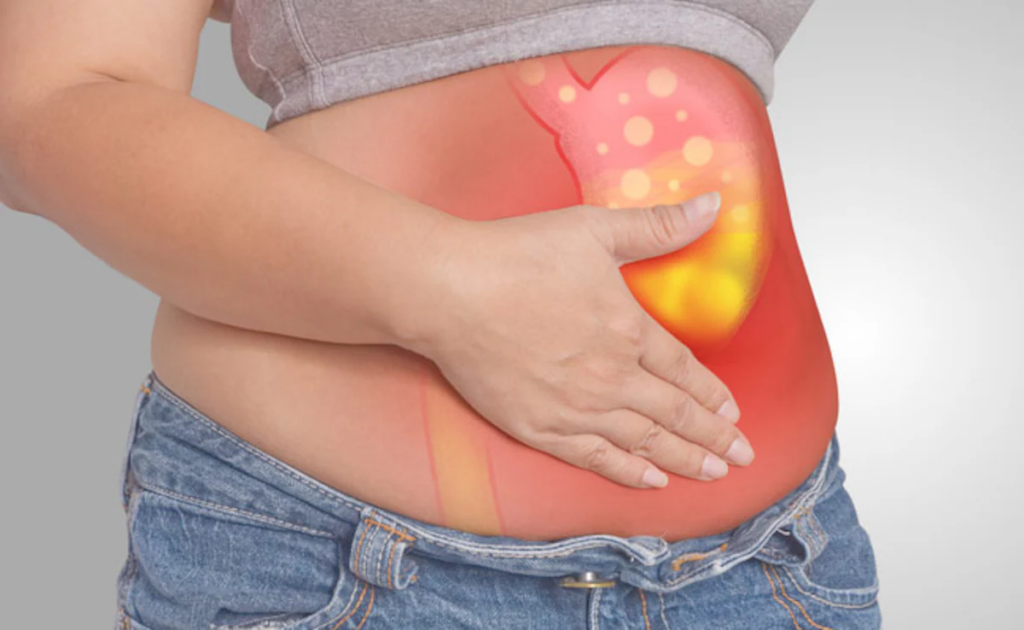Scouring the internet looking for what tea is best for bloating? You’ve landed on the right page.
We’ve all had those days when we wake up bloated and full of gas, even though we didn’t eat anything that could upset our stomach the day before. Unfortunately, bloating is quite normal and a common issue for many men and women alike.
Did you know that 14% people in America are severally affected by Bloating
Bloating can be caused by many different reasons, such as taking up a certain diet, specific health conditions, menstrual symptoms, and more. While it is nothing to be alarmed over, it can cause discomfort in your digestive tract and abdomen for a while.
Fortunately, herbal tea can be a great holistic remedy for abdominal bloating. Several herbal teas have been shown to support digestion, increase regularity, and protect against certain conditions that can contribute to bloating.
Preliminary studies also suggest that several herbal teas can help soothe this uncomfortable condition.

What is ‘Bloating’?
What is ‘Bloating’?
Bloating is a condition where your belly feels swollen, often due to gas. It’s like there’s extra air or gas in your stomach that makes it feel bigger and sometimes uncomfortable. It can happen for different reasons, like eating certain foods, having digestive problems.
One common cause of bloating is constipation. You can be constipated and not realize it, since having fewer bowel movements than you normally do is just one symptom of constipation.
Minor bloating every so often shouldn’t be cause for concern. However, if you’re experiencing frequent or painful bloating after eating, it’s best to consult your registered dietitian or health care provider to rule out medical causes.
What tea is Best for Bloating?
While tea is generally a healthful drink that can soothe many different ailments, there are certain kinds of teas that are better than others when combating indigestion and bloating.
1. Peppermint Tea
Peppermint and peppermint tea have been used for a long time to help with digestive problems like bloating. It’s considered one of the best herbal teas for bloating because it contains a lot of flavonoids.
Flavonoids work like helpers that calm down the bacteria in your stomach that can make indigestion and bloating worse. Plus, studies suggest that peppermint is a potent ingredient that can help relax your gut, which can help with stomach cramps and the bloating and pain that come with them.
2. Lemon Tea
Lemons and citrus fruits are famous for their strong cleansing effects on our bodies and minds, especially when we add them to tea. Lemons can ease mild tummy troubles like bloating and gas and help our digestion work smoothly.
3. Ginger Tea
Ginger tea has been a trusted remedy for stomach problems since ancient times. It’s not only good for your body but also for your spirit. We highly suggest drinking ginger tea, especially if you’re feeling bloated.
Supplements containing ginger and artichoke have been shown to promote the movement of food through the intestinal tract and decrease digestive discomfort It’s known to help digestion and reduce stomach cramps.
For added soothing effects, try adding a little honey and lemon to your ginger tea.
4. Chamomile Tree
Chamomile (Matricaria chamomilla) is a member of the daisy family with small, white flowers.Chamomile tea is not only delectable in taste, but also great for your health and relaxation. We’re big fans of chamomile for its many benefits. Those tiny chamomile flowers do wonders for your body. They can lower the levels of bad bacteria, soothe stomach aches, prevent diarrhoea, and reduce gas instantly. You can sip on chamomile tea anytime of the day, but it’s especially helpful if your stomach feels bloated or upset. Plus, it is also a potent ingredient to help you get a better night’s sleep.
5. Green Tea
If you enjoy drinking green tea, you’ll be happy to hear that it can actually is great for bloating and any other digestion problem. Studies show that green tea has a slight diuretic effect on the body, which means it helps to flush out extra water and sodium. Green tea contains antioxidants and polyphenols that work together to reduce bloating by getting rid of excess fluids.
So, next time you feel bloated, just drink a warm cup of green tea and you definitely feel better.
6. Fennel Tea
Fennel seeds taste a bit like licorice and have been used for ages to help with digestion. They’re known to ease problems like constipation, bloating, gas, and tummy aches. You can make tea with fennel seeds, and it tastes similar to licorice.
Foods to Avoid While You’re Bloated
1. Sweetened Food
- Candy
- Packaged bread and baked goods
- Packaged fruit
- Sweetened dairy products like yogurt
- Sauces like ketchup
- Soft drinks and juice
2. Fructose Rich Food
- Apples
- Watermelon
- Grapes
- Grapefruit
- Nectarine
- Plums
- Peaches
- Ripe bananas
- Prunes
- Raisins
3. Milk and Dairy Products
Lactose-free products can be substituted for dairy products (milk or ice cream) to cut down on bloating, but not all of your favorites are off the table.
4. Beans
Lentils, peas and many beans contain raffinose, a type of sugar that the body has trouble breaking down. Beans are also rich in fiber, and a high intake can increase gassiness.
5. Fermented Food
Though fermented foods are known to be good for gut health but some fermented food can cause can bloating and gas. For that reason, it is best to limit consumption of food like Kimchi and Kombucha.
What Type of Food Can Help With Bloating?
- Eating lots of fiber, exercising regularly, and drinking plenty of water are proven way to help with bloating caused by constipation from milk. This simple method can quickly and effectively relieve discomfort and help you feel better.
- Rifaximin is an antibiotic often prescribed to treat people with irritable bowel syndrome (IBS) who don’t have constipation. It’s known for its ability to help reduce bloating, a common symptom of IBS.
- Probiotics are helpful bacteria that you can take to balance the natural bacteria in your intestines. You can get them as over-the-counter supplements, which come in pill form and in yogurt.


